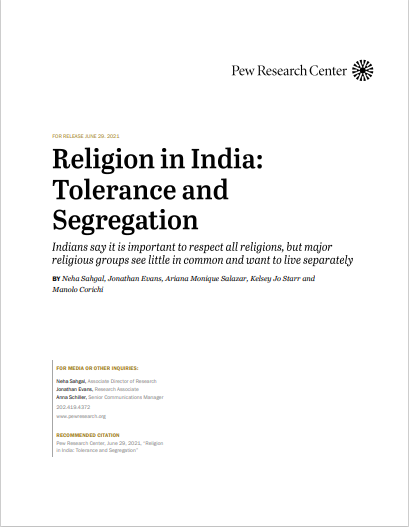
Religions in india: tolerance and segregation PDF
233 Pages·2021·5.2221 MB·other
Most books are stored in the elastic cloud where traffic is expensive. For this reason, we have a limit on daily download.
Preview Religions in india: tolerance and segregation
Description:
This study is Pew Research Center’s most comprehensive, in-depth exploration of India to date.
For this report, we surveyed 29,999 Indian adults (including 22,975 who identify as Hindu, 3,336
who identify as Muslim, 1,782 who identify as Sikh, 1,011 who identify as Christian, 719 who
identify as Buddhist, 109 who identify as Jain and 67 who identify as belonging to another religion
or as religiously unaffiliated). Interviews for this nationally representative survey were conducted
face-to-face under the direction of RTI International from Nov. 17, 2019, to March 23, 2020.
To improve respondent comprehension of survey questions and to ensure all questions were
culturally appropriate, Pew Research Center followed a multi-phase questionnaire development
process that included expert review, focus groups, cognitive interviews, a pretest and a regional
pilot survey before the national survey. The questionnaire was developed in English and translated
into 16 languages, independently verified by professional linguists with native proficiency in
regional dialects.
Respondents were selected using a probability-based sample design that would allow for robust
analysis of all major religious groups in India – Hindus, Muslims, Christians, Sikhs, Buddhists and
Jains – as well as all major regional zones. Data was weighted to account for the different
probabilities of selection among respondents and to align with demographic benchmarks for the
Indian adult population from the 2011 census. The survey is calculated to have covered 98% of
Indians ages 18 and older and had an 86% national response rate.
For this report, we surveyed 29,999 Indian adults (including 22,975 who identify as Hindu, 3,336
who identify as Muslim, 1,782 who identify as Sikh, 1,011 who identify as Christian, 719 who
identify as Buddhist, 109 who identify as Jain and 67 who identify as belonging to another religion
or as religiously unaffiliated). Interviews for this nationally representative survey were conducted
face-to-face under the direction of RTI International from Nov. 17, 2019, to March 23, 2020.
To improve respondent comprehension of survey questions and to ensure all questions were
culturally appropriate, Pew Research Center followed a multi-phase questionnaire development
process that included expert review, focus groups, cognitive interviews, a pretest and a regional
pilot survey before the national survey. The questionnaire was developed in English and translated
into 16 languages, independently verified by professional linguists with native proficiency in
regional dialects.
Respondents were selected using a probability-based sample design that would allow for robust
analysis of all major religious groups in India – Hindus, Muslims, Christians, Sikhs, Buddhists and
Jains – as well as all major regional zones. Data was weighted to account for the different
probabilities of selection among respondents and to align with demographic benchmarks for the
Indian adult population from the 2011 census. The survey is calculated to have covered 98% of
Indians ages 18 and older and had an 86% national response rate.
See more
The list of books you might like
Most books are stored in the elastic cloud where traffic is expensive. For this reason, we have a limit on daily download.
